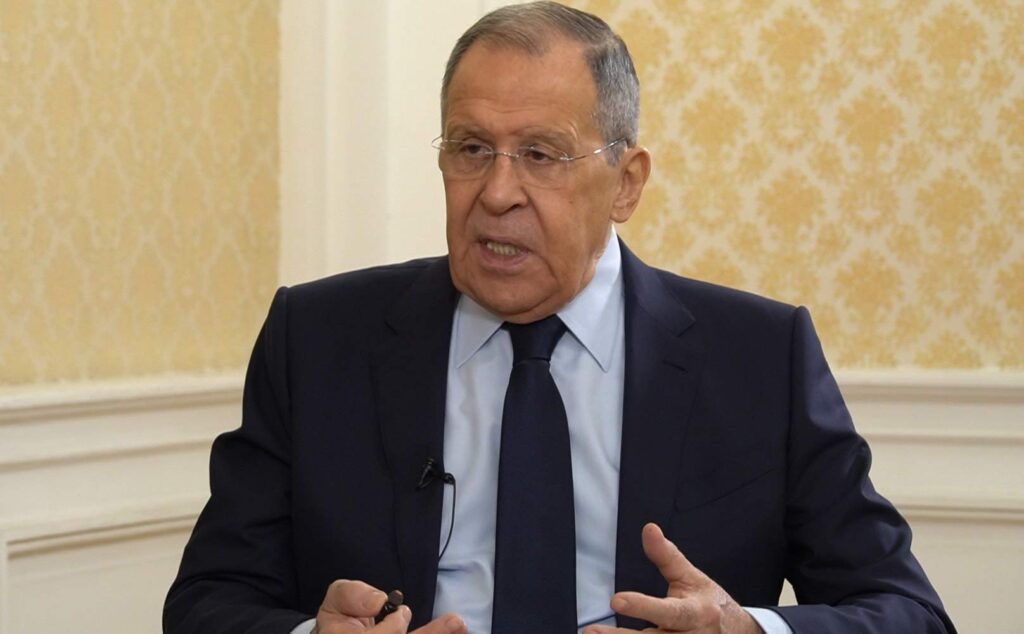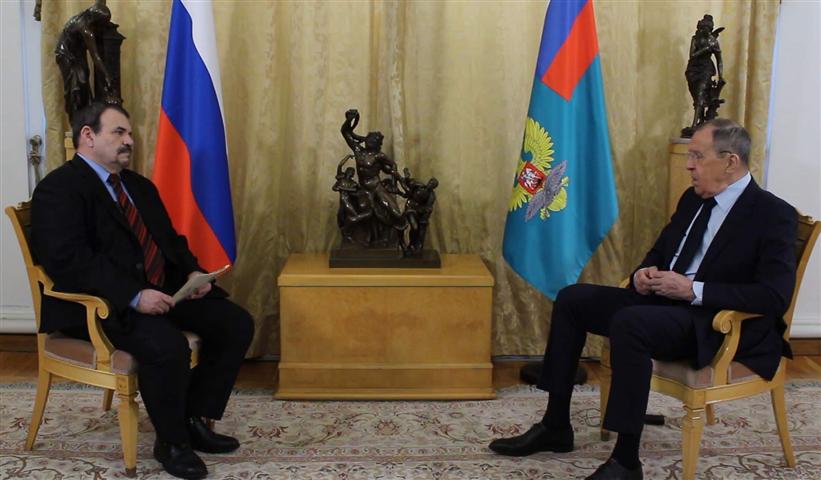In an exclusive interview with Prensa Latina, he said that there was no other alternative after all attempts to achieve a political settlement through, for example, the implementation of the Minsk agreements tht were rejected.
In addition to the conflict in Ukraine, the minister commented on issues such as Russia is coping with Western sanctions, relations with African, Asian and Latin American nations, and specifically the ties with Cuba.
Prensa Latina: Minister, as a result of the special military operation in Ukraine, what have been the main directions of work of the Russian diplomacy?
Serguei Lavrov: The goals and objectives of the special military operation were clearly defined by Russian President Vladimir Putin in his speech in February last year, and they remain unchanged.
We could no longer tolerate the line of the West, which once again decided to choose Nazi theory and Nazi practice to declare war, this time a hybrid war against the Russian Federation.

The war is being waged by Ukrainian military on the orders of the Kiev regime. But as Ukrainian leaders themselves say, if there is no continuous supply of more and more offensive weapons to Ukraine, then Ukraine will lose.
This is a very characteristic confession. It means only one thing, that the West is a direct participant in this conflict.
Without it, it would have ended long ago, it would have enabled the end of the war long ago, it would have enabled the elimination of the threats that have loomed over the entire Russian-speaking population of the country since the beginning of the 2014 coup d’état.
In that country education in Russian has been banned ever since, as well as its use even in everyday life, not to mention the closure of the media.
And, of course, this regime was used by the West not only to destroy everything Russian, which has always existed throughout the history of those lands and has existed in modern Ukraine.
Also in order to create direct threats to the security of the Russian Federation with the creation of military bases and other infrastructure of the North Atlantic Treaty Organization (NATO) in Ukraine.
We had no other choice. After all our attempts to achieve a political settlement through the implementation of the Minsk agreements, and then, in December 2021, by negotiating an agreement with the United States and NATO on mutual guarantees, equivalent to indivisible security, were rejected.
Therefore, I think that all those who are more or less interested in what is going on and who are more or less objective, understand perfectly well what is at stake. And in our case, we have nothing to hide.
We are fighting for the security of our country, which for the last 30 years have been consistently attacked by the West, mainly by the United States, which ignored all treaties in the field of strategic stability.
We are also fighting for the fate of those people, which the Kiev regime publicly threatened to destroy. It declared them terrorists. And we protect the fate of these people; we protect their rights, in full accordance with the UN Charter, with international conventions.
We defend their right to determine how they want to continue to live on the lands that belonged to their ancestors for centuries and centuries.
Such self-determination, as you know, already took place in 2014 in Crimea and last year in the Donetsk People’s Republic and the Lugansk People’s Republic, in the Zaporozhie and Kherson regions. So this is a reality that no one can leave aside.
Prensa Latina: Russia is facing a large-scale economic war, but in the West itself they seem to understand the failure of that policy of strangulation and that is why perhaps they are trying to pressure other countries in Latin America, Africa and Asia to join that policy. What can you tell us about it?
Sergey Lavrov: This policy has failed, just as the West’s plan to drastically weaken Russia and inflict a strategic defeat on the battlefield is failing.
Well, plus an increasing number of Western mercenaries meeting their end on Ukrainian battlefields.
You are right, three quarters of all states in the world, mainly Asia, Latin America, Africa, did not join the sanctions. They are constantly being blackmailed, threatened they would have no financing, Western governments are creating problems for them to obtain loans from the International Monetary Fund and the World Bank. Therefore, they demand to vote in the UN and other international organizations to support resolutions condemning the Russian Federation. And it is happening. But we know by what unscrupulous, literally bandit methods these votes are very often obtained. We know very well.
They are blackmailing everyone that has bank accounts in the United States and those ambassadors –and other figures- who have children studying in the West.
This cannot be called diplomacy. This is pure below-the-belt blackmail. I don’t remember this even during the Cold War.
But three-quarters of the planet, a group of countries that we call the world majority, that often do not approve of these blackmailing, when they vote, do not join the sanctions and are not going to do so.
More and more nations are beginning to understand that playing along with the West, blindly following their policy can be dangerous, too, for them at any given time.
No one knows who, next year or a year from now, will be recognized by Americans as a threat, as an object of attack, of isolation, whose punishment may play a positive role in presidential elections or mid-term congressional elections.
In American, everything is tied to their own selfish interests. At this time, another second democracy summit was held by President Joe Biden. But the circle of guests is very, very indicative. There are no clear criteria.
There, the only criterion is loyalty, not so much to American democracy, but loyalty to the ruling Democratic Party of the United States.
As far as, in principle, sanctions are concerned, yes, of course, we are experiencing certain difficulties, but we are overcoming them, to the astonishment of those who prophesied the collapse of the Russian economy and the collapse of the country.
But President Putin has more than once made a detailed assessment of the efforts being made by the Government and the results which, to the surprise of many in the West, and even of some experts in Russia, have been achieved. Moreover, our diplomacy is actively creating conditions for these efforts to be as effective as possible.
In particular, we are participating in negotiations between our departments and their foreign partners on the creation of mechanisms independent from the West and the delivery of products and guaranteeing their financing.
I can say, and I must say it, that in this work we are inspired by the example of Cuba, which has been living for many decades under the absolutely illegal US sanctions, which are maintained against the clear political will expressed by the overwhelming majority of the member countries of the United Nations, with the exception of three or four that are not independent.
And from year to year this position is confirmed with total disdain for the United States.
Prensa Latina: You recently spoke at the ministerial meeting of the G20 group held in New Delhi on the strengthening of the integration mechanism of the Community of Latin American and Caribbean States (CELAC, in Spanish), could you elaborate on that idea and also tell us about Russia’s perspective of collaboration with Latin America?
Sergey Lavrov: As for the development of CELAC and the strengthening of integration processes, we simply comment on what we observe, what Latin American and Caribbean countries are doing.
We welcome the revival of the spirit of regional solidarity in CELAC, after a period of calm, so to speak, and a lack of interest in its work on the part of some Latin American governments.
It is once again a priority grouping, now considered by all Latin American and Caribbean nations as a key tool for promoting their collective interests in the formation of a multipolar world.
Since 2013, with CELAC there has been a mechanism for meetings between the ministers of Russia and the bloc quartet, but due to pandemic restrictions, it has not been held in recent years.
Now we hope to resume this practice and we sense mutual interest, including from the leadership of St. Vincent and the Grenadines, which now chairs the regional body. I am sure that this is a very promising partnership, especially now that emerging leaders are very committed to strengthening the community.
From the point of view of the interests of Latin America and of each country in the region, you reminded me that the subject of CELAC was mentioned in a meeting with journalists on the sidelines of the G20 summit.
I believe that CELAC as an organization, in the case of consensus, may well qualify for permanent independent participation in the G20 group, under the same conditions in which we have now invited the African Union to this partnership.
It seems to me that this will reflect the processes of multipolarity in those discussions taking place under the auspices of the G20.
Prensa Latina: Cuba and Russia, subjected by the US unilateral punitive measures, maintain a close collaboration in several fields, how do you see the prospects of development of these ties and the strategic cooperation established between the two countries?
Sergey Lavrov: Yes, the nature of our relations is described as a strategic partnership. But this is a very dry characterization. They are, of course, deeper, they are rooted in human relations, in sympathy between our peoples. And, of course, they will develop.
After all, we have been cooperating for many decades, under those same sanctions, under conditions where they tried by all possible means to interfere in our relations by creating difficulties.
So we have already developed mechanisms and capabilities to achieve results, despite the restrictive measures taken by the West.
And now, as I said, with all our friends, with all the partners, we are developing new approaches to create supply chains, new approaches to financing, to banking operations that will in no way depend on the whims of the United States.
By the way, it is not only the countries in the global south of the world that want to get rid of most of these whims, but also some European countries.
They too understand that they are being used, even within the Swift system. European nations see what is happening to their economies in a situation where they are forced to finance not only the war, but also everyday life in Ukraine.
That is due to the inability of the Kiev regime to do it and to do something in that regard.
We see how Europe is losing its competitive advantages and was forced to abandon cheap Russian gas. In general, Europe is approaching the line of deindustrialization and companies are leaving for the United States.
All this, so to speak, will not be in vain, and a re-evaluation of everything that is going on has already begun, even in the minds of European politicians.
If there are politicians who still have nothing on their minds, then I am convinced that the people of Europe will remind them and try to introduce them to a sense of reality.
lmg/mar/odf/gfa










